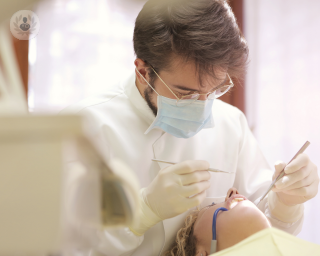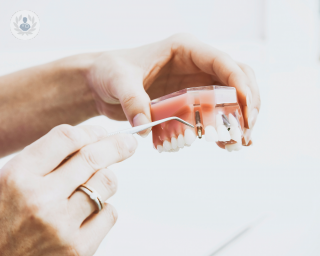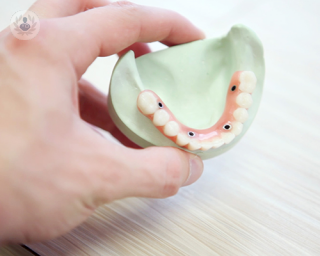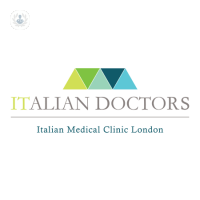What is peri-implantitis?
Peri-implantitis is a dental implant infection, which can occur following dental implants if proper dental hygiene is not followed.

Symptoms of peri-implantitis:
An infected dental implant (peri-implantitis) may cause the following symptoms:
- bleeding or pus
- fever
- throbbing pain
- redness and swelling in the gums
- bad breath
- difficulty chewing your food
- the implant feeling loose
Medical tests to diagnose peri-implantitis
If you have the above symptoms, book an appointment with a dentist who will be able to confirm an infection upon inspection.
What are the causes of peri-implantitis?
A dental implant can become infected if food debris or bacteria gets lodged in the implant, which can lead to the formation of an infection.
Can peri-implantitis be prevented?
Preventative care is possible to avoid peri-implantitis, much of which can be done at home. It’s important to keep your dental implant clean. The best ways to keep them clean at home are to do the following:
- brush daily
- floss daily
- use mouthwash
It is also a good idea to have the implant cleaned professionally periodically. This cleaning will be thorough and include scaling of the tooth or implant’s surface. This should happen every 6 months when you make your 6 monthly visit to the dentist or hygienist.
To avoid infection directly after having an implant inserted, the following will help:
- Avoid disturbing the implant.
- Rinse 2-3 times day with salt water.
- Apply ice if there is discomfort or pain.
- When brushing, be very gentle on the implant.
Treatments for peri-implantitis
If an implant becomes infected very soon after it is inserted, treatment may include antibiotics or replacing the implant altogether.
For later infections to implants, antibiotics will be given, but if the infection is too severe, surgery will be required.
Which type of specialist treats peri-implantitis?
A dentist can treat peri-implantitis.
05-31-2018 04-19-2023Peri-implantitis
What is peri-implantitis?
Peri-implantitis is a dental implant infection, which can occur following dental implants if proper dental hygiene is not followed.

Symptoms of peri-implantitis:
An infected dental implant (peri-implantitis) may cause the following symptoms:
- bleeding or pus
- fever
- throbbing pain
- redness and swelling in the gums
- bad breath
- difficulty chewing your food
- the implant feeling loose
Medical tests to diagnose peri-implantitis
If you have the above symptoms, book an appointment with a dentist who will be able to confirm an infection upon inspection.
What are the causes of peri-implantitis?
A dental implant can become infected if food debris or bacteria gets lodged in the implant, which can lead to the formation of an infection.
Can peri-implantitis be prevented?
Preventative care is possible to avoid peri-implantitis, much of which can be done at home. It’s important to keep your dental implant clean. The best ways to keep them clean at home are to do the following:
- brush daily
- floss daily
- use mouthwash
It is also a good idea to have the implant cleaned professionally periodically. This cleaning will be thorough and include scaling of the tooth or implant’s surface. This should happen every 6 months when you make your 6 monthly visit to the dentist or hygienist.
To avoid infection directly after having an implant inserted, the following will help:
- Avoid disturbing the implant.
- Rinse 2-3 times day with salt water.
- Apply ice if there is discomfort or pain.
- When brushing, be very gentle on the implant.
Treatments for peri-implantitis
If an implant becomes infected very soon after it is inserted, treatment may include antibiotics or replacing the implant altogether.
For later infections to implants, antibiotics will be given, but if the infection is too severe, surgery will be required.
Which type of specialist treats peri-implantitis?
A dentist can treat peri-implantitis.


10 treatment factors that influence the long-term success of your dental implants
By Dr Koray Feran
2025-01-25
The long-term success of any dental implant relies heavily upon both the patient’s medical and dental history and a good level of hygiene care they maintain post-treatment. However, there are certain steps that a dental practitioner needs to follow when carrying out the treatment that will also help contribute to its longevity. Dr Koray Feran explains more. See more


Peri-implantitis: how to treat dental implant infection
By Dr Shirin Parsno
2025-01-24
If you have had dental implants, it is really important to have routine follow-up examinations in order to prevent peri-implantitis. The disease is accompanied by receding, bleeding gums and can be avoided with regular trips to the hygienist. Read more from our expert Dr Shirin Parsno on how the condition is treated. See more


Patient advice: how can I make my dental implants last?
By Dr Koray Feran
2025-01-24
At least 10% of dental implants in the UK will have significant problems that will lead to their loss within the first 10 years. Dr Koray Feran, an implant and restorative dental surgeon based in London, explains what a successful and failing dental implant looks like and how you can influence the long-term success of your new teeth. See more


What are my chances of developing peri-implantitis if I have dental implants?
By Dr Koray Feran
2025-01-20
Peri-implantitis is an inflammation of the soft tissues around a dental implant, leading to bone loss. It's a common condition, but with the right strategies, it can be prevented. We asked implant and restorative dental surgeon, Dr Koray Feran, for tips on what you can do if peri-implantitis develops. See more
Experts in Peri-implantitis
-
Dr Koray Feran
DentistryExpert in:
- Bone reconstruction
- Dental implants
- Advanced Prosthodontics
- Periodontal Surgery
- Cosmetic dentistry (aesthetic dentistry)
- Peri-implantitis
-
Dr Amit Mohindra
DentistryExpert in:
- Dental implants
- Immediate loading implants (Teeth in a day)
- Guided implant surgery
- Tooth replacement
- Conscious sedation
- Peri-implantitis
-
Dr Karolina Wolowiec
DentistryExpert in:
- Dental implants
- Bone reconstruction
- Oral surgery
- Dental crown
- Periodontal Surgery
- Peri-implantitis
-
Dr Francesca Bianchi
DentistryExpert in:
- Gingivitis
- Peri-implantitis
- Periodontitis
- Periodontal cleaning
- Dental implants maintenance
- Teeth whitening
- See all

Italian Doctors
Italian Doctors
24E Little Russell St, London, WC1A 2HS
No existe teléfono en el centro.
By using the telephone number provided by TOP DOCTORS, you automatically agree to let us use your phone number for statistical and commercial purposes. For further information, read our Privacy Policy
Top Doctors

Medicare Clinic
Medicare Clinic
603 Oxford Rd, Reading RG30 1HL, United Kingdom
No existe teléfono en el centro.
By using the telephone number provided by TOP DOCTORS, you automatically agree to let us use your phone number for statistical and commercial purposes. For further information, read our Privacy Policy
Top Doctors

LCIAD - The London Centre for Implant and Aesthetic Dentistry
LCIAD - The London Centre for Implant and Aesthetic Dentistry
28 Wimpole St, London
No existe teléfono en el centro.
By using the telephone number provided by TOP DOCTORS, you automatically agree to let us use your phone number for statistical and commercial purposes. For further information, read our Privacy Policy
Top Doctors
-
Italian Doctors
24E Little Russell St, London, WC1A 2HS, Central LondonExpert in:
- Cardiology
- Gastroenterology
- Obstetrics and Gynaecology
- Dentistry
- Paediatrics
- Psychiatry
-
Medicare Clinic
603 Oxford Rd, Reading RG30 1HL, United Kingdom, ReadingExpert in:
- Allergy
- Cardiology
- Orthopaedic surgery
- Ultrasound
- Endocrinology
- Fertility
-
LCIAD - The London Centre for Implant and Aesthetic Dentistry
28 Wimpole St, London, Central LondonExpert in:
- Porcelain veneers
- Oral surgery
- Crowns
- Fillings
- Endodontics
- Surgical endodontics
- Most viewed diseases, medical tests, and treatments
- Trigeminal neuralgia
- Snoring
- Chronic headache
- Botulinum toxin (Botox™)
- Platelet-rich plasma
- Cleft palate
- Tooth wear
- Tooth sensitivity
- Tooth abscess
- Facial pain






